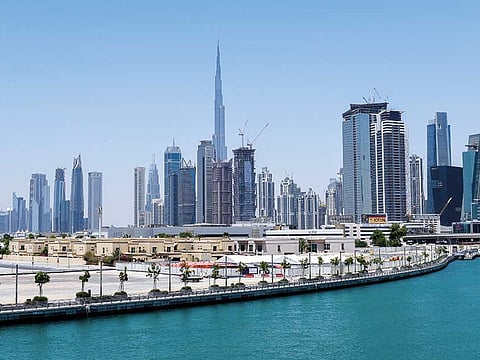Tap UAE's public sector employees to create next generation of SMEs and unicorns
UAE Government could provide support schemes to smooth such a switch

What makes a country entrepreneurial?
The easy answer to this is how much do small and medium Enterprises (SMEs) contribute to the Gross Domestic Product (GDP). This includes job creation and contributing to government revenues.
The not so straightforward answer is how many unicorns - companies valued at a minimum of $1 billion - the country is producing. Turning an SME into a unicorn could be what makes it or breaks it for a country’s economic future, especially for the UAE.
This would mean that business ideas have been successfully scaled up, and that the ideas behind those businesses are interesting enough to be expanded beyond domestic borders into the wider region, or even globally. Growing beyond being just another SME into a unicorn adds credibility and legitimacy to the business idea, more so as serial individual investors and venture capitalists would not bet on an idea that they do not think would prove feasible and profitable in the future.
Unicorns can be contagious. Estonia, for example, is a country with more unicorns per capita than any other. Ostensibly, being focused on SMEs and turning them into unicorns has created an entrepreneurial ecosystem with its own momentum, producing more SMEs and potential unicorns than the local market can handle and absorb. The immediate outcome here is a regional and international outlook as soon as they secure their initial rounds of funding.
Interestingly too, and once the regional or international footprint has been secured, many of those SMEs or unicorns come back home. That, it seems, takes place to attract specialised local talent and to contribute to the country’s economic growth.
Regulations would help
It is important to note here than an entrepreneurial ecosystem cannot be enforced, but facilitated through the right regulations. Doing so makes it easier to raise funds and to continue raising funds when the business idea is viable, instead of just starting the business or getting the trading license. In all cases, it takes time for an entrepreneurial ecosystem to be mature enough for investors and venture capitalists to look at a country and think that this is where the next unicorn is coming from.
Having produced a few unicorns already, the UAE seems to be on the right track. There are, nevertheless, a few points that could accelerate the growth, thus amplify the likelihood of SMEs becoming unicorns as part of a wider entrepreneurial ecosystem.
Based on observation, ex-public sector employees constitute a sizable number of entrepreneurs in Estonia. Notwithstanding that this defies the notion of successful entrepreneurs being high school dropouts, it also ascertains that the entrepreneurial ecosystem in the country goes beyond being thriving to being attractive enough for public sector employees.
In other words, it is worthwhile for civil servants to drop a secure monthly pay in order to pursue a business idea that may or may not succeed. Such a move can only be possible with a strong social safety net in place, and a strong entrepreneurial ecosystem that is willing to take chances on business ideas. The Estonian Founders Society attests to the latter.
For the UAE, a move away from public sector employment does not necessarily mean a shift to the private sector. Instead, civil servants could be encouraged to venture on their own.
Make it worth their while
For such a move to take place, the UAE’s government could weigh the direct and indirect costs of public sector employment versus a guaranteed basic monthly income for a year or two. The basic income must be calculated in a way that covers essential family needs, depending on family size.
It should also consider a future desired pension that does not add to the government’s future pay-out burden but provides an additional sense of safety for entrepreneurs. Also, besides publicly provided healthcare and education services, subsidies could be provided to partially cover schooling fees in private education providers.
The same could be said for health insurance, where a basic pan-UAE coverage could be provided regardless of where the entrepreneur resides and operates.
Moreover, the UAE’s government may want to allocate additional seed money, through existing SME funds, towards strengthening the entrepreneurial ecosystem. It could work with major semi-government companies to domicile venture capital funds within them.
Bring in the funds
Those funds, in collaboration with interested private sector players, could contribute to the shift from being civil servants to entrepreneurs. Semi-government companies stand not only to benefit from a more sustainable payroll in the future, but to also create local producers and service providers from which they can source and procure their future needs.
Ultimately, this would expand the SMEs sector and improve their chances of becoming unicorns, all the while contributing to job creation in non-public sectors.
To summarise, it is never too late for a country to introduce the right regulations that could support the growth of SMEs and future unicorns, which can create and strengthen an entrepreneurial ecosystem with its own momentum. This includes making it easier for civil servants to move from public sector employment to becoming entrepreneurs.
While there is no single recipe for a country to be entrepreneurial, there are ways to increase its appeal. By providing basic income and pension among other benefits, and by making it convenient enough to access funds, the UAE government is in the right position to establish a vibrant entrepreneurial ecosystem.
It starts today, and hopefully, goes on forever. The last thought that I want to leave you with: How competitive would the UAE be if a company could be based in one emirate, but operate in seven?
Sign up for the Daily Briefing
Get the latest news and updates straight to your inbox










